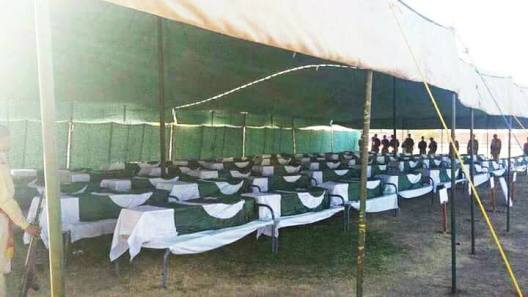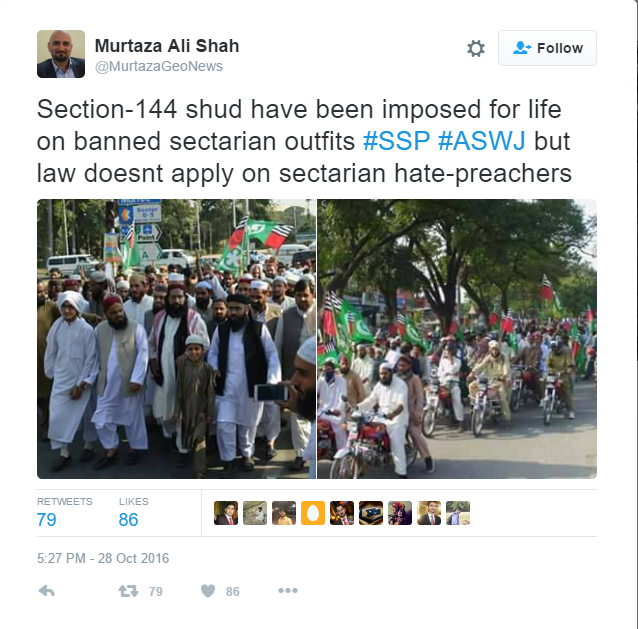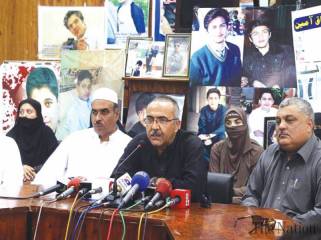*Originally published in Pakistan Today:
Mirrored by a decline in the number of terrorist attacks and incidences and the restoration of a semblance of law and order, Pakistan’s fight against terrorism has recently begun to be touted as a story of success.
However, within the month of December alone, a number of developments occurred which question this assertion. There occurred a siege and attack by a mob of 1,000 people on an Ahmadi mosque in Chakwal, during which a 65-year old man belonging to the persecuted minority suffered and died of cardiac arrest. The Federal Minister for Religious Affairs Sardar Muhammad Yusuf also happened to present a “peace award” to apostle of peace and esteemed ambassador of inter-sectarian harmony Masroor Nawaz Jhangvi, who is now a member of the Punjab Assembly after winning the PP-78 Jhang by-election. Furthermore, flocks of people were reported to be drawing to a site at the outskirts of the capital which was revealed to be the grave of Mumtaz Qadri that is now being turned into a shrine. News of the interior ministry’s preparation of the draft of a law which seeks to give military courts, whose term expired on January 7, permanent status also did the rounds. Lastly, while Jibran Nasir struggles to get a case registered against Abdul Aziz for his declared allegiance to ISIS and for incitement of hate against Shias, pressure from the Sunni Tehreek led to the registration of an FIR and a spate of death threats against Shaan Taseer, son of slain governor Salmaan Taseer, for conveying Christmas greetings to Christians in Pakistan and expressing hope of redressal for those subjected to the blasphemy law.
That these developments occurred within the span of a single month is an unsettling realization which also asks for the direction and narrative of Pakistan’s campaign against terrorism and extremism to be probed and reviewed.

A concrete answer to the question and status of Pakistan’s fight against terrorism and extremism is found in Justice Qazi Faez Isa’s inquiry report into Quetta’s Civil Hospital attack of 9th August 2016. The 110 page report provides extensive insights into the “monumental failure to combat terrorism and perform basic protocols” especially pertaining to the National Action Plan. It mentions not only a lack of action against proscribed organizations, that have freely held rallies in Islamabad, but also a brazen “cavorting” by key government figures with the heads of these organizations, as was demonstrated by the meeting between the interior minister and Ahmed Ludhianvi of Ahle Sunnat Wal Juma’at. The report further makes mention of lapses, limitations and inadequacies in terms of the tools and methodologies used to investigate attacks; along with sheer negligence in “silencing extremist speech, literature, and propaganda” and the stark “shortsightedness” of the federal and provincial governments in thwarting terrorism and extremism.

The report is an act of Qazi Isa’s professional integrity and bravery, but it is also a damning expose and indictment of the government, the interior ministry and the failure and façade that is the National Action Plan.
The number of terrorist attacks and incidents in Pakistan may have registered a considerable drop in numbers but they are far from over. In fact, their focus in certain areas and upon certain communities remains as forceful and fatal as ever. The past year alone remains relevant in illustrating this. In 2016, a Shia majlis was attacked in Nazimabad, killing four. But denial about targeted killings of the beleaguered Shia community persist within the wider narrative of the population. Quetta was also frequently besieged by tragedies which have ceaselessly continued to devour and devastate the city. In August, the blast at the Civil Hospital killed an entire generation of the city’s legal community, while the attack on the police training academy took the lives of 61 cadets and guards. In September, suicide-bombers targeted a mosque in Mohmand Agency, and an Imambargah in Shikarpur during Eid prayers. Earlier in 2016, the attacks on Bacha Khan University and Gulshan-e-Iqbal Park took place. The sites for terrorist assaults may have shifted to neglected and orphaned “peripheries” like Quetta and FATA, but the danger and threat persist. And they will linger as long as state institutions remain divided on the matter and continue to keep in place dubious policies and doctrines that bar an unequivocal commitment to counter extremism and terrorism in all tints and tones. This is no longer a contention but a judgement officially articulated and validated by Justice Isa’s report.
On the other hand, the lifted moratorium on the death penalty, perhaps the only implemented measure of the much-hailed National Action Plan, continues to work in full force without any hindrance of transparency and accountability. According to the Justice Project Pakistan, an estimated 400 prisoners have been executed since the lifting of the moratorium, pulling Pakistan to the position of the third most prolific executioner globally. The JPP also states that a slim 16 per cent of the executions carried out since December 2014 were tied to charges of terrorism, while the rest involved juveniles and disabled inmates. The mockery and sham of justice continues at the courts and the gallows.
Moreover, the attack which gave rise to a national sense of urgency in dealing with terrorism has yet to be investigated. The APS attack, which the so-called “paradigm shift” and the National Action Plan were predicated upon, has actually been the subject of a concerted and brazen campaign of silencing and harassment which has been directed at the parents who have been tirelessly and bravely demanding an inquiry and investigation into the ghastly attack. Two years on, an inquiry into the APS attack has not been ordered but actively suppressed.
In light of these realities, as Pakistan steps into 2017 it is necessary to proceed with cautious optimism and realize that the calm engendered by a decline in terrorist attacks is relative and temporary as long as the roots and the many manifestations of the menace are not tackled.
 This relative calm should not engender a sense of complacency among the federal and provincial governments whose approach to the issue already comprises craven surrender, prevarications and papering over the problem.
This relative calm should not engender a sense of complacency among the federal and provincial governments whose approach to the issue already comprises craven surrender, prevarications and papering over the problem.
The scourge of terrorism and extremism doesn’t only need to be subdued but stifled and strangled to an end. There exists a dire for a fundamental change in the framework, direction, orientation and agendas of the state and the actors steering them. Neither declarations, nor a rhetoric of resolve and programs like the National Action Plan would suffice. Templates and infrastructures like the NAP can only aid and facilitate actual implementation on ground which demands political will, courage, vision and resolve that repudiate political expediency, cavorting, patronizing, pacifying and pandering to militant, sectarian organizations and the many faces and forms of extremism. Until then, Pakistan’s success against terrorism, drawn from a decrease in the number of attacks, must be recognized as partial success in a war with multiple battles and fronts, a war still far from a conclusion today.
-Hafsa Khawaja


 Most alarmingly, the APS tragedy, which the so-called “paradigm shift” and the grand National Action Plan were predicated upon, has been the subject of a
Most alarmingly, the APS tragedy, which the so-called “paradigm shift” and the grand National Action Plan were predicated upon, has been the subject of a 
 Madrassah reform is a daunting task but the consequences of not dismantling ideological and territorial sanctuaries that maintain an infrastructure of extremism are even more disquieting – for which every organ of the state has to be united and mobilized in orientation, policy and action, until which all gains against terrorism in Pakistan will be tenuous at best, as the targeting of Bacha Khan University has shown.
Madrassah reform is a daunting task but the consequences of not dismantling ideological and territorial sanctuaries that maintain an infrastructure of extremism are even more disquieting – for which every organ of the state has to be united and mobilized in orientation, policy and action, until which all gains against terrorism in Pakistan will be tenuous at best, as the targeting of Bacha Khan University has shown.